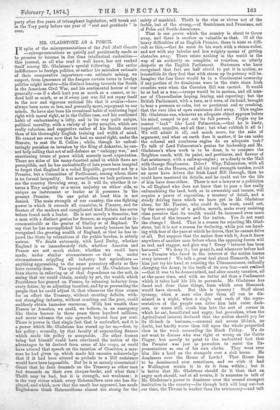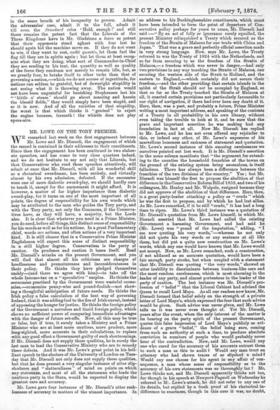MR. GLADSTONE AS A FORCE.
IN spite of the misrepresentations of the Pall _Wall Gazette —misrepresentations so quietly and persistently made as to promise to become in due time intellectual curiosities— this journal, as all who read it well know, has not ranked itself among Mr. Gladstone's special following. His entire indifference to foreign politics, or rather his mistaken estimate of their comparative importance—an estimate arising, we suspect, from ignorance of the dangers certain turns in foreign politics might involve—his distinct leaning towards the South in the American Civil War, and his sentimental horror of war generally—as if a shell hurt you as much as a cancer, or in- deed half as much, or as if every just war did not repay itself in the new and vigorous national life that it evokes—have always been more or less, and generally more, repugnant to our minds. So have also been his occasional habit of confusing legal right with moral right, as in the Collier case, and his confirmed habit of embarrassing a lofty, and in its way quite unique, political morality, with a variety of petty scruples, which are really valueless, and suggestive rather of his Scotch descent than of his thoroughly English training and width of mind. He cannot see even now that he had no moral right, under the Statute, to seat Sir R. Collier ; while, though he unhesi- tatingly punishes an invasion by the King of Ashantee, he can- not help calling that act of self-defence an "unhappy war," and sanctioning terms of peace which scarcely meet expectation. There are sides of his many-facetted mind in which flaws are perceptible, and he has undoubtedly of late years been tempted to forget that England is a veiled Republic, governed not by a Premier, but a Committee of Parliament, among whom there is no formal inequality. But nevertheless we lack patience to see the country throwing away, as it will do, whether it re- turns a Tory majority or a mean majority on either side, so unique an instrument or leader as it possesses in the present Premier. On one point at least this is not denied. The main strength of our country, the one fighting power in which it exceeds all countries, is Finance, and for finance of the modern and complicated kind Britain has never before found such a leader. He is not merely a financier, but a man with a distinct genius for finance, as separate and as in- communicable as the genius of Shelley or of Raphael. To say that he has accomplished his feats merely because he has recognised the growing wealth of England, or that he has in- jured the State by relaxations of the public burden, is utterly untrue. We doubt extremely, with Lord Derby, whether England is so immoderately rich, whether America and France are not much richer, whether we could have made, under similar circumstances — that is, under circumstances crippling all industry bat agriculture — anything approaching to the same pecuniary efforts as they have recently done. The special power of Mr. Gladstone has been shown in relieving us of that dependence on the soil, in seeing that we could obtain, mainly by art, the wealth which Providence has poured on France, by releasing industry from every fetter, by so adjusting taxation, and by so persuading the people that he could adjust it, that whenever the time comes for an effort the Treasury, without creating deficits, with- out strangling industry, without crushing out the poor, could suddenly obtain immense resources. With less wealth than France or America, we could, we believe, in an emergency like theirs borrow in three years three hundred millions, and never advance the rate upwards beyond four per cent. There is power in that single fact that is unrivalled, and it is a power which Mr. Gladstone has stored up for us,—first, by his policy ; secondly, by that faculty of expounding finance which made his policy so acceptable. No other human being but himself could have convinced the nation of the advantages to be derived from some of his coups, or could
have uttered that speech on the taxation of Charities, a mea- sure he had given up, which made his enemies acknowledge that if it had been uttered as prelude to a Bill resistance would have been impossible. But he is so meanly economical ? Grant that he feels demands on the Treasury as other men feel demands on their own cheque-books, and what then ?
Thrift may be bad, but it is strength, not weakness ; it is the very virtue which every Hohenzcllern save one has dis- played, and which, now that the result has appeared, has made Englishmen think Hohenzollerns almost too strong for the safety of mankind. Thrift is the vice or virtue not of the feeble, but of the strong,—of Scotchmen and Prussians, not of Poles and South-Americans.
That is one power which the country is about to throw away, and there is another as valuable as that. Of all the heavy difficulties of an English Premier, there is none so diffi- cult as this,—that he must do his work with a steam-roller, and not with any inferior and less weighty means of getting obstacles away. There exists nothing in the world in the way of an authority so complete, so resistless, so utterly despotic as the English Parliament. Statesmen who have recognised that fact are half afraid to put it in motion, so irresistible do they feel that with steam up its potency will be. Imagine the fuss there would be in a Continental monarchy if any portion of its dominions were in the state some Irish counties were when the Coercion Bill was carried. It would be as bad as a war,—troops would be in motion, and all man- ner of Chancelleries hoping, fearing, and reporting ; but the British Parliament, with a turn, as it were, of its hand, brought to bear a pressure so calm, but so persistent and so crushing, that the very idea of open resistance died away. This engine Mr. Gladstone can, whenever an adequate object appears before his mind, compel to put out its full powers. People say he cannot "lead " like Lord Palmerston,—that he is hasty, impatient, unpolite, and all that ; but what rubbish it all is I We will admit it all, and much more, for the sake of argument, and what on earth does it matter, if he can make the colossal and cumbrous engine do an adequate task ? To talk of Lord Palmerston's genius for leadership and Mr. Gladstone's when work is to be done, is to compare the Brighton coach, with its paint, and prettiness, and flavour of fast aristocracy, with a railway-engine ; or a dandy in the Mall with George Stephenson. Drive? Why, Palmerston, with all his hold on the Houses, and all his real strength besides, could no more have driven the Irish Land Bill through, than he could have mastered its details, and he could not for the life of him have done either. There is not a lawyer or a politician in all England who does not know that to pass a law really enfranchising the land, both as to ownership and tenure, will require a power of exposition, a mastery of detail, and a steady driving force which we have got in Mr. Gladstone alone, for Mr. Forster, who could do the work, could not, by the mere magic of a golden mouth, make every resisting class perceive that its wealth would be increased even more than that of the tenants and the nation. You do not want the change ? Good. That is a reason for rejecting Mr. Glad- stone, but it is not a reason for declating, while you are howl- ing with fear of the pace at which he drives, that he cannot drive at all. But suppose that the nation does wish it, does it know anywhere of another man before whom the opposing forces will so reel, and stagger, and give way ? Every "interest has been harassed." We deny it ; but grant it, and whenever before had we a Premier who dared in the interest of the nation harass every interest ? We talk a great deal about Bismarck, but let him just try his hand at resisting the Ultramontanes, radically changing the Army, in the teeth of its own fear—not realised —that it was to be democratised, and alter county taxation, all at the same time, and with no better aid than a Parliament which it takes half his life to persuade. Mr. Gladstone has dared and done those things, from which even Bismarck would have shrunk. But this is tyranny ? Stuff about tyranny, when a man who does them all can be dis- missed in a night, when a single real rush of the repre- sentatives of the people can drive him into outer dark- ness, or worse still, crush him into the sort of corner in which he sat, humiliated and angry, but powerless, when the Agricultural interest declared that the nation should pay for its ill-luck in business,—unusual and severe ill-luck, no doubt, but hardly worse than fell upon the whole propertied class in the week succeeding the Black Friday. We do not want to discuss who was right or wrong on the Cattle Plague, but merely to point to the undoubted fact that the Premier was just as powerless to resist the Re- presentatives as one of his own clerks. They went over him like a herd on the stampede over a sick horse. He domineers over the House of Lords ? That House has to be domineered over sometimes, and we wish it had a Wellington within it to do it from within ; but it is better that Mr. Gladstone should do it than that an angry mob should, and at all events, it is nonsense to talk of Mr. Gladstone's power to domineer over the second strongest institution in the country—for though both will long out-last our time, the Throne is weaker than the aristocracy—and talk
in the same breath of his incapacity to govern. Admit the adversaries' case, admit it to the full, admit it
till even the Standard cries Hold, enough !' and still there remains the patent fact that the Liberals of the Three Kingdoms have in Mr. Gladstone a force so potent that their opponents stand aghast with fear lest he should again bid the machine move on. If they do not want to win, if they want to rest, cadit qualtio, let them furl the flag till they are in spirits again ; but let them at least recog- nise what they are doing, what sort of Commander-in-Chief they are sending to his tent, the quantity as well as quality of the force they condemn not merely to remain idle, but, as we greatly fear, to betake itself to other tasks than that of governing a nation,—which we do not accuse of ingratitude, for nations can seldom be grateful, but of downright stupidity in not seeing what it is throwing away. The nation would not have been ungrateful for banishing Stephenson lest his " kittle o' steam' should go about maazing and haazin the blessid fields," they would simply have been stupid, and so it is now. And of all the varieties of that stupidity, the worst is that which thinks it " genteel " to reject the engine because, forsooth ! the whistle does not play opera-airs.



































 Previous page
Previous page